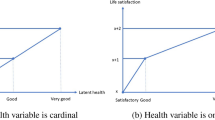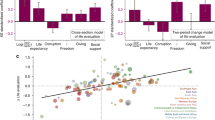Abstract
Intertemporal judgments are paired comparisons between the present time and some other time (e.g. “How satisfied are you with your life these days compared to five years ago?”). These judgments can provide evidence on the question, “Is life satisfaction in developed nations increasing, decreasing, or remaining constant?” This paper provides the first review of intertemporal judgments of life satisfaction, and reports a meta-analysis of 71 such studies from 9 developed countries. Results show that in every survey that asks people how happy their own lives are now compared to some past time, a majority says they are happier now than in the past. The meta-analysis also shows that this question must be carefully distinguished from asking about quality of life of the average person, which shows a majority believing that life was better for the “average person” in the past. These two beliefs are logically inconsistent, since the average respondent actually says their satisfaction is higher now. We consider several sources of bias that may influence these results, including cognitive processing heuristics, self-appraisal (desirability) bias, and information bias in media news.
Similar content being viewed by others
REFERENCES
Abramson, P.R. and R. Inglehart: 1995, Value Change in Global Perspective (University of Michigan Press, Ann Arbor).
Barnes, S.H., B.G. Farah and F. Heunks: 1979, ‘Personal dissatisfaction, in political action: Mass participation in five western democracies’, in S.H. Barnes and M. Kaase (eds.), Political Action (Sage Publications, London).
Berger, C.R.: 2001, ‘Making it worse than it is: Quantitative depictions of threatening trends in the news’, Journal of Communication 51, pp. 655–677.
Campbell, A., P.E. Converse and W.L. Rodgers: 1976, The Quality of American Life: Perceptions, Evaluations, and Satisfactions (Russell Sage Foundation, New York).
Cummins, R.A., R. Eckersley, J. Pallant, J. Van Vugt, J. Shelley, M. Pusey and R.A. Misajon: 2001, ‘Developing a National Index of Subjective Wellbeing: Australian Unity Index’, on web at: http://acqol.deakin.edu.au/index wellbeing/ index.htm
Davis, J.A.: 1984, ‘New money, an old man/lady and ‘two's company’: Subjective welfare in the NORC General Social Surveys, 1972–1982’, Social Indicators Research 15, pp. 319–350.
Diener, Ed and S. Oishi: 2000, ‘Money and happiness: Income and subjective well-being across nations’, in E. Diener and E.M. Suh (eds.), Subjective Well-being Across Cultures (MIT Press, Cambridge, MA) pp. 185–218.
Diener, Ed and R.E. Lucas: 2001, ‘Explaining differences in societal levels of happiness: Relative standards, need fulfillment, culture, and evaluation theory’, Journal of Happiness Studies 1, 41–78.
Easterlin, R.A.: 1995, ‘Will raising the incomes of all increase the happiness of all?’, Journal of Economic Behavior and Organization 27, pp. 35–47.
Easterlin, R.A.: 2001, ‘Income and happiness: Toward a unified theory’, Economic Journal 111(473), pp. 465–484.
Eckersley, R.: 2000, ‘The mixed blessings of material progress: Diminishing returns in the pursuit of happiness’, Journal of Happiness Studies 1(3), pp. 267–292.
Fan, D.P.D., M. Fibison, D. Shah, S.S. Smith and M. Watts: 1997, ‘News media, candidates and issues and public opinion in the 1996 presidential campaign’, Journalism and Mass Communication Quarterly 74, pp. 718–737.
Frederick S. and G. Loewenstein: 1999, ‘Hedonic adaptation’, in D. Kahneman, E. Diener and N. Schwarz (eds.), Well-being: The Foundations of Hedonic Psychology (Russell-Sage Foundation, New York) pp. 302–329.
Frey, B.S. and A. Stutzer: 2002, ‘What can economists learn from happiness research?’, Journal of Economic Literature 40, pp. 402–435.
Hagerty, M.R. and R. Veenhoven: 2001, ‘Wealth and happiness revisited: Growing wealth of nations does go with greater happiness’, Social Indicators Research, forthcoming.
Inglehart, R.: 1977, The Silent Revolution: Changing Values and Political Styles Among Western Publics (Princeton University Press, Princeton).
Krause, J.S. and M. Sternberg: 1997, ‘Aging and adjustment after spinal cord injury: The roles of chronological age, time since injury, and environmental change’, Rehabilitation Psychology 42, pp. 287–302.
Lowenstein, G. and J. Elster (eds.): 1992, Choice overTime (Russell Sage Foundation, New York).
Oswald, A.J.: 1997, ‘Happiness and economic performance’, Economic Journal 107, pp. 1815–1831.
Pew Center for People and the Press: 1999, National survey on July 3, 1999. Washington, DC.
Polling the Nations: 2001, Electronic database at http://spweb.silverplatter.com.
Ross, M., A. Eyman and N. Kishchuk: 1986, ‘Determinants of subjective well-being’, in J.M. Olson, C.P. Herman and M.P. Zanna (eds.), Relative Deprivation and Social Comparison, vol. 4, pp. 79–93.
Runyon, W.M.: 1980, ‘The life satisfaction chart: Perceptions of the course of subjective experience’, International Journal of Aging and Human Development 11(1), pp. 45–64.
Schwarz, N. and F. Strack: 1999, ‘Reports of subjective well-being: Judgmental processes and their methodological implications’, in D. Kahneman, Ed Diener and N. Schwarz (eds.), Well-Being: The Foundations of Hedonic Psychology (Sage, New York).
Schwarz, N., M. Wanke and H. Bless: 1994, ‘Subjective assessments and evaluations of change: Some lessons from social cognition research’, in W. Stroebe and M. Hewstone (eds.), European Review of Social Psychology (John Wiley, New York).
Seidlitz, L. and E. Diener: 1993, ‘Memory for positive versus negative life events: Theories for the differences between happy and unhappy persons’, Journal of Personality and Social Psychology 64(4), pp. 654–664.
Silver, R.L.: 1982, ‘Coping with an undesirable life event:Astudy of early reactions to physical disability’, Doctoral Dissertation, Northwestern University, Evanston, IL.
Veenhoven, R.: 1993, Happiness in Nations (RISBO, Rotterdam, Netherlands).
Veenhoven, R.: 2001, Bibliography of Happiness, http://www.eur.nl/fsw/research/ happiness
Wilson, A.E. and M. Ross: 2001, ‘From chump to champ: People's appraisals of their earlier and present selves’, Journal of Personality and Social Psychology 80(4), pp. 572–584.
Wood, F.W. (ed.): 1990, An American Profile: Opinions and Behavior, 1972–1989: Opinion Results on 300 High-interest Issues (Gale Research, Detroit).
Zapf, W., Habich, Roland, Bulmahn, Thomas, Delhey and Jan: forthcoming, 2003, ‘Transformation through unification: Social structure, welfare development and modernization in Germany’, in Adamski, Wladyslaw, Machonin, Pavel, Zapf and Wolfgang (eds.), Structural Change and Modernization in Postsocialist Societies (Krämer, Hamburg).
Zillmann, D. and H.-B. Brosius: 2000, Exemplification in Communication: The Influence of Case Reports on the Perception of Issues (Lawrence Erlbaum Assoc., Mahwah, NJ).
Author information
Authors and Affiliations
Corresponding author
Rights and permissions
About this article
Cite this article
Hagerty, M.R. Was Life Better in the “Good Old Days”? Intertemporal Judgments of Life Satisfaction. Journal of Happiness Studies 4, 115–139 (2003). https://doi.org/10.1023/A:1024406800912
Issue Date:
DOI: https://doi.org/10.1023/A:1024406800912




